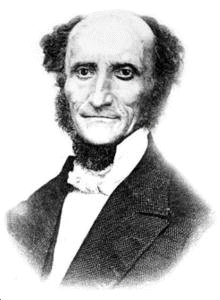C. F. W. Walther
| C. F. W. Walther | |
|---|---|
 |
|
| Born | October 25, 1811 Langenchursdorf, Kingdom of Saxony |
| Died | May 7, 1887 St Louis, Missouri |
| Education | University of Leipzig |
| Spouse(s) | Emilie Buenger |
| Church | Lutheran Church–Missouri Synod (LCMS) |
| Ordained | January 15, 1837 |
| Writings | The Proper Distinction Between Law and Gospel, Church and Ministry, Der Lutheraner (periodical) |
|
Congregations served
|
Trinity Lutheran Church, St Louis, Missouri |
|
Offices held
|
President, LCMS (1847-1850; 1864-1878) President, Concordia Seminary |
Carl Ferdinand Wilhelm Walther (October 25, 1811 – May 7, 1887) was the first President of the Lutheran Church–Missouri Synod and its most influential theologian. He is commemorated by that church on its Calendar of Saints on May 7. He has been described as a man who sacrificed his homeland, his health, and nearly his life for the freedom to speak freely, to believe freely, and to live freely. He was dedicated to his Church and the faith for those he loved.
C.F.W. Walther was born a pastor's son in Langenchursdorf in the Kingdom of Saxony (part of modern-day Germany). Out of a strong religious commitment, he immigrated to the United States in 1838. On September 21, 1841, he married Emilie Buenger. They had six children. He started two important publications, and was author of many books and periodical articles. He was also the head pastor of the four Saxon Lutheran congregations (called Gesammtgemeinde) in St. Louis (Trinity, Holy Cross, Immanuel and Zion). In August 1855, Walther turned down an honorary doctorate from the University of Göttingen, but in 1877 he accepted a Doctor of Theology (Th.D.) degree from Capital University in Columbus, Ohio. He died of a serious illness in St. Louis on May 7, 1887, and was buried at Concordia Cemetery, where a mausoleum was later built in his honor.
Ferdinand, as he was called by his family, was first educated by his father. At the age of eight he attended school in Hohenstein for two years. He then entered "Latein Schule" ("Latin school", college preparatory school comparable to today's junior or community college) in Schneeberg, from which he graduated in September 1829.
One month later he enrolled in the University of Leipzig to begin his study of theology and joined his older brother Otto Hermann, who was enrolled in the same university. During his college years in Leipzig he contracted a near-fatal lung disease and had to interrupt his studies for six months. While ill and recuperating, he assiduously read the works of Martin Luther and became convinced that Luther's theology clearly taught the doctrines of Holy Scripture. He also began believing in the importance of a firm confessional position.
...
Wikipedia
